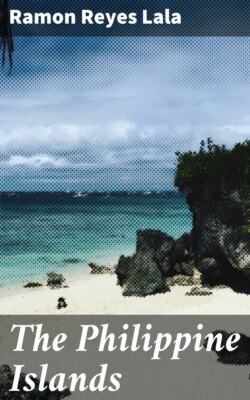Читать книгу The Philippine Islands - Ramon Reyes Lala - Страница 9
На сайте Литреса книга снята с продажи.
Adventures of Juan Sebastian Elcano.
ОглавлениеTable of Contents
Reduced, at last, to about 100 men and two ships, the Spaniards decided to return home. The captain of one of these—of the Victoria—was Juan Sebastian Elcano. This gallant sailor, after losing many brave companions and meeting many thrilling adventures, at last brought his ship safely to a Spanish port—three years after he had embarked, en route to the Moluccas, under his first commander, the unfortunate Magellan.
When Elcano and his seventeen companions landed in Spain, they were mere skeletons, so reduced were they by hunger and disease. Everywhere they were received with acclamations of joy, and upon their arrival in Seville they straightway proceeded to the Cathedral, where, amid grand Te Deums, they gave thanks to God for their return.
It must, indeed, have been a strange sight to see this remnant, these gaunt survivors of the splendid company of adventurers that had left that city but three years before—flaming with zeal for the spread of the Church, and glowing in the desire of conquest—these few half-starved wretches, now walking barefooted, with lighted candles, through the streets—all that was left of that eager throng.
And yet, pitiable as they were, they must have been conscious of an achievement that meant glory for their country and immortality for themselves.
Nor were they unrewarded. All received food and money, and Elcano, the leader, was voted a life-pension of 500 ducats; and, in token of his great accomplishment in having first circumnavigated the globe, the King knighted him, awarding him, as his escutcheon, a globe with the motto: “Primus circundedit me.”
The cargo of the Victoria consisted of 26½ tons of cloves and other spices: cinnamon, sandalwood, nutmegs, and so forth. It is said that one of the Tidor islanders, brought back with the expedition, who was presented to the King, was never permitted to return to his home, because he had committed the blunder of making inquiry regarding the value of spices in the Spanish markets.
The Trinidad, the other vessel of this remarkable expedition, after many terrible hardships, fell into the hands of the Portuguese, who sent the survivors to Lisbon. They reached that port five years after their departure with Magellan.
The enthusiasm of the Spanish monarch and his subjects on account of these remarkable discoveries was unbounded. Other expeditions to the islands were soon fitted out. One, under the leadership of Ruy Lopez de Villalobos, gave to them the name of the Philippine Islands. This was in honor of Philip, Prince of Austria, the son of King Charles I., heir-apparent to the throne of Castile; to which, in 1555, upon the abdication of his father, he succeeded as Philip II.
This bigot, convinced by his religious advisers of the importance of winning the newly-discovered islands for the Church, caused another expedition to be fitted out from Navidad, in the South Sea.
